Will Santa be coming this year .. and what religion is he?
Dec 9th, 2005 | By Dominic Berry | Category: Key Current Issues If you have been around since the late 1940s, you just might be prompted to reflect about the differences between what very definitely just used to be called Christmas, now and then.
If you have been around since the late 1940s, you just might be prompted to reflect about the differences between what very definitely just used to be called Christmas, now and then.
And this year the gap seems almost so wide that someone in some proper position of authority probably ought to call the whole thing off. (Canadians are supposed to be paying attention to their federal election campaign now in any case.) You could say that the main problem is the appallingly saccharine commercialization of the event in the rabidly free market economy of the early 21st century. But that wouldn’t be quite right. Christmas was appallingly commercial back in the good old days too. The main difference is just that it was commercialized with more raw human appeal.
Yes, Virginia … 
The holiday season, viewed in this way, is of course mostly about Santa Claus, and mostly for kids. And the main reason for my current near-seminal disenchantment, no doubt, is that I am now simply beyond question too old. Yet I have a deeper sympathy for the kids of today, who as I inevitably bump into them in the big city, in all their contemporary striking cultural diversity, still seem a pretty good crop. In my view, they are getting woefully short-changed.
When I was a kid, the downtown department stores really put on a holiday show for children of all ages – in a way that, as best as I can tell, no proper commercial organization anywhere remotely approximates nowadays. To start with, you wrote a letter to Santa Claus, saying that you’d behaved well, and specifying the rewards to which you felt entitled. After you mailed your letter to the North Pole, c/o the local department store, Santa would actually write back to you, on some fine paper that included his picture.
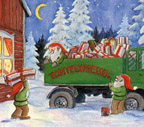 Then a bit later, for greater certainty, you would go and visit Santa at the store downtown, and tell him in person again that you’d behaved rather well, and perhaps specify some additional rewards, which you had neglected to mention in your earlier letter. Your picture would be taken with Santa for the official records. And then you would ride through toyland on the toy train, along with a group of your peers, and eat some candy floss before going home.
Then a bit later, for greater certainty, you would go and visit Santa at the store downtown, and tell him in person again that you’d behaved rather well, and perhaps specify some additional rewards, which you had neglected to mention in your earlier letter. Your picture would be taken with Santa for the official records. And then you would ride through toyland on the toy train, along with a group of your peers, and eat some candy floss before going home.
On your way home, you paused to study the department store windows. They were decked out with an urbane elegance – and a sheer extravagance – that now seems to have altogether vanished. It may or may not be true that the average person is better off these days, with more cars and better housing, as is often enough said. But both adults in a family household typically have to work to keep up with the Joneses now. And there often seems less real leisure, to take the time and trouble with holiday preparations that make a difference, even in store windows.
More blessed to give than receive …
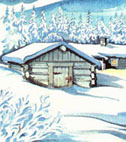 In fact, when I was a kid myself I don’t actually remember finally getting anything, from Santa Claus or anyone else, that was all that expensive. And I certainly gave an imposed rather long list of resolutely inexpensive gifts on my own account.
In fact, when I was a kid myself I don’t actually remember finally getting anything, from Santa Claus or anyone else, that was all that expensive. And I certainly gave an imposed rather long list of resolutely inexpensive gifts on my own account.
The big trouble of course with a very commercialized Christmas, in which Santa is the leading figure, is that families who don’t have much money to spare at the moment inevitably feel left out. Once I went with a church youth group that included a girl I thought I liked, to give a “Christmas basket” to a local “needy” family. And that was such an appalling experience that I never did it again. (Such things should just be mailed anonymously, and certainly not accompanied by those said to be giving them.)
As with all holidays that depend on families too, the quite large numbers of adults in any big city at any one point in time who are not really connected up with families can find the year-end holiday season oppressive. But, again or finally, what about religion – which on some views is still what the holiday is supposed to be all about? How does that fit in, then and now?
Hanukkah and beyond …
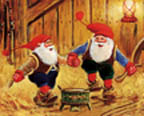 To start with, as Jon Stewart has just pointed out on the Daily Show, even in the old days Christmas was just the start of the holiday season for kids. You had several subsequent days of sheer freedom and not going to school, in which to take stock of whatever new-found wealth you had managed to accumulate at the bottom of Santa’s chimney. And then this was finally capped by a riotous celebration on New Years’ Eve – in my childhood experience an even bigger and better party than Christmas Eve.
To start with, as Jon Stewart has just pointed out on the Daily Show, even in the old days Christmas was just the start of the holiday season for kids. You had several subsequent days of sheer freedom and not going to school, in which to take stock of whatever new-found wealth you had managed to accumulate at the bottom of Santa’s chimney. And then this was finally capped by a riotous celebration on New Years’ Eve – in my childhood experience an even bigger and better party than Christmas Eve.
So the religious observance of Christmas was not finally the main event of the holiday season after all. And besides, I grew up in a neighbourhood where a substantial Jewish community lived side by side with the already squabbling Catholics and Protestants. I was well aware that Hanukkah was a viable religious alternative to Christmas itself. It was even said to have the advantage that it included several consecutive days of gift-giving.
The only real trouble with Hanukkah, of course, was that – no matter how much longer it lasted – it was just not so decisively linked with the mystical largesse of Santa Claus. (Later in life I knew some adult Jewish people who actually liked to go through the motions of celebrating Christmas for just this reason.) And it often seems that nowadays it is Santa Claus and not Jesus Christ whom most more recent big city residents from Muslim, Hindu, Buddhist, Confucian, Animist, and other religious backgrounds find most annoying, in the still prevailing old year-end holiday season.
You better watch out …
 The big trouble here seems to be that Santa Claus remains powerful enough in society to get to your children, no matter what your present-day religious background (or lack thereof).
The big trouble here seems to be that Santa Claus remains powerful enough in society to get to your children, no matter what your present-day religious background (or lack thereof).
It is easy enough to see why some hard-working heads of Muslim or Hindu households, e.g., struggling to get established in the rabidly free market economy of the early 21st century metropolis, are sometimes irked by pressure from their kids to get expensive presents from Santa at Christmas, even though celebrating Christmas has nothing to do with their chosen free and democratic religious commitments.
Anyway, where does religion fit in nowadays, in the very end? It says something further about how more generally abhorrent the year-end holiday season has become that probably the most sensible thing to do is just look at some government statistics. (Or quasi-government statistics: in the USA it is not entirely legal for the government to collect statistics about religion.) And here they are:
|
CANADA 2001 |
UNITED STATES 2001 |
||
|
Religion |
% |
Religion |
% |
|
Catholic |
43.7 |
Catholic |
24.5 |
|
Christian Orthodox |
1.6 |
Orthodox |
0.3 |
|
Protestant |
29.2 |
Protestant and Other Christian |
51.9 |
|
Other Christian |
2.6 |
||
|
TOTAL CHRISTIAN |
77.1 |
TOTAL CHRISTIAN |
76.7 |
|
Muslim |
2.0 |
Jewish |
1.4 |
|
Jewish |
1.1 |
Muslim |
0.5 |
|
Buddhist |
1.0 |
Buddhist |
0.5 |
|
Hindu |
1.0 |
Hindu |
0.4 |
|
Sikh |
1.0 |
||
|
Eastern religions |
0.1 |
||
|
Other religions |
0.2 |
Other religions |
0.9 |
|
TOTAL OTHER |
6.4 |
TOTAL OTHER |
3.7 |
|
NO RELIGION |
16.5 |
NO RELIGION |
14.2 |
|
Refused to answer |
5.4 |
||
|
TOTAL |
100.0 |
TOTAL |
100.0 |
SOURCES: Statistics Canada; US Bureau of the Census, Statistical Abstract of the United States 20042005, Table 67.
Dec 12-14: The counterweights editors take another look at similar data …
ALBERTA IS THE SECOND MOST GODLESS PROVINCE IN CANADA .. an election note ..
 In today’s complex free and democratic society we are almost always trying to simplify things. And understandably so. But sometimes it does just take us further and further from reality.
In today’s complex free and democratic society we are almost always trying to simplify things. And understandably so. But sometimes it does just take us further and further from reality.
In the still lukewarm holiday-season Canadian election campaign, e.g., one near-certainty is that Stephen Harper’s Conservatives will take almost every seat in Alberta on January 23, 2006. From here, we often hastily deduce that since fierce advocates of religion in politics are a big part of the current conservative base elsewhere in North America, Alberta too must be an unusually God-fearing part of Canada.
 Yet in the 2001 Canadian census almost a quarter of Albertans (23.6%) reported that they had “No religion.” Among all 10 provinces, only British Columbia next door had a higher percentage of voters so uninterested in any kind of God (35.9%). On average across the country, only 16.5% of all Canadians told Statistics Canada that they had “No religion.”
Yet in the 2001 Canadian census almost a quarter of Albertans (23.6%) reported that they had “No religion.” Among all 10 provinces, only British Columbia next door had a higher percentage of voters so uninterested in any kind of God (35.9%). On average across the country, only 16.5% of all Canadians told Statistics Canada that they had “No religion.”
Alberta will no doubt still be voting very solidly Conservative in January 2006. But who knows exactly what this means for the future of Canada? Consider too that the current provincial political king, Ralph Klein, is a reformed alcohol consumer who still smokes cigarettes, and what else can you say? Alberta, in fact, is one of the most Godless places in the country.
What does the Statistics Canada data on religion really mean?
 It is of course possible to quibble quite seriously about the meaning of the data on religion that Statistics Canada collects in its decennial census.
It is of course possible to quibble quite seriously about the meaning of the data on religion that Statistics Canada collects in its decennial census.
Nowadays answers to such questions as “how many times did you go to church last year?” are much better barometers of religious passion than the bland official statistic that more than three-quarters of all Canadians reported some attachment to Christian religions in 2001. [A number apparently quite similar to what prevails in the USA next door – see table above.]
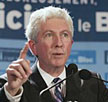 It is widely said, e.g., that the people of Quebec are no longer at all as strongly attached to the Catholic Church headquartered in Rome as they were even a half-century ago. You feel this yourself when you visit the place today, and see the often quite small numbers of people in its many still awesome church buildings from an earlier era.
It is widely said, e.g., that the people of Quebec are no longer at all as strongly attached to the Catholic Church headquartered in Rome as they were even a half-century ago. You feel this yourself when you visit the place today, and see the often quite small numbers of people in its many still awesome church buildings from an earlier era.
Yet in the Canadian census of 2001 Quebec still appears as the second most God-fearing part of the country – with some 83% of its population still declaring some form of allegiance to the Roman Catholic Church (and 90% to some form of Christianity more generally – well above the 77% in Canada at large). Among all 10 provinces, only Newfoundland and Labrador has a lower percentage of people reporting “No religion.” (And if you actually know anyone from Newfoundland and Labrador, this may strike you as rather surprising too.)
% “NO RELIGION” BY PROVINCE IN CANADA, 2001
|
Province |
% No Religion |
|
British Columbia |
35.9 |
|
Alberta |
23.6 |
|
Manitoba |
18.7 |
|
Ontario |
16.3 |
|
Saskatchewan |
15.7 |
|
Nova Scotia |
11.9 |
|
New Brunswick |
8.0 |
|
Prince Edward Island |
6.7 |
|
Quebec |
5.8 |
|
Newfoundland and Labrador |
2.5 |
|
Yukon Territory |
38.6 |
|
Northwest Territories |
17.8 |
|
Nunavut Territory |
6.2 |
|
CANADA |
16.5 |
SOURCE: Statistics Canada.
Even more Godless BC as a “cliffhanger battleground” in the 2006 election …
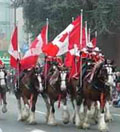 At the same time, the information on religion that Statistics Canada collects in its decennial census must mean something. And it also seems a bit intriguing that the clearly most Godless province of beautiful BC (with more than twice as large a share of its population reporting “No religion” as in Ontario, e.g.) is now being described as “poised to be a cliffhanger battleground” in the January 2006 federal election.
At the same time, the information on religion that Statistics Canada collects in its decennial census must mean something. And it also seems a bit intriguing that the clearly most Godless province of beautiful BC (with more than twice as large a share of its population reporting “No religion” as in Ontario, e.g.) is now being described as “poised to be a cliffhanger battleground” in the January 2006 federal election.
According to a “new poll for CanWest News Service and Global National,” the “Liberals were the choice of 34 per cent of decided voters … Stephen Harper’s Conservatives were next at 30 per cent, while Jack Layton’s NDP trailed at 16 per cent nationally.” The “Ipsos-Reid survey” also “reinforces a story line so far in the campaign that British Columbians are almost evenly split in support for the Liberals, NDP and Conservatives.” And this “virtual [dead] heat makes the province and its 36 seats a major target for the three rival parties.”
 What might the unusually high rate of Godlessness in BC mean for the ultimate result?
What might the unusually high rate of Godlessness in BC mean for the ultimate result?
You could at first jump to the conclusion that since the crypto-socialist New Democrats are the most Godless party, it’s all good news for NDP leader Jack Layton. But then you might recall that two great icons of New Democrat history – J.S. Woodsworth and T.C. “Tommy” Douglas – were actually both clergymen before they became politicians.
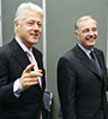 From here it’s easy enough to suddenly realize that if there is any truly Godless party in Canada today, it has to be the federal Liberals. Except Lester Pearson was a clergyman’s son, and all of Pierre Trudeau, Jean Chretien, and Paul Martin were and/or are practising Catholics.
From here it’s easy enough to suddenly realize that if there is any truly Godless party in Canada today, it has to be the federal Liberals. Except Lester Pearson was a clergyman’s son, and all of Pierre Trudeau, Jean Chretien, and Paul Martin were and/or are practising Catholics.
Which finally brings you back to the Conservatives – the party of decisive majority choice in the second most Godless province of Alberta, due east of BC. Except again, even here, if Canada had proportional representation in Parliament, as some nowadays are urging, instead of the first-past-the-post electoral system it presently has, even the Liberals would have taken six of Alberta’s 28 seats in June 2004, instead of the two that they actually did win.
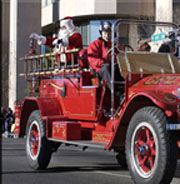 On the other hand, yet again, you might be struck by the parallel statistics that Alberta had 23.6% of its population reporting “No religion” in 2001, and gave 22.0% of its popular vote to the Liberals in the 2004 federal election. If the Godless truly are mostly Liberal voters in the very end, and if this is going to be the most decisive factor in 2006, then the Liberals should win, say, around 34% of the BC vote on January 23 – up about four points or so from 2004.
On the other hand, yet again, you might be struck by the parallel statistics that Alberta had 23.6% of its population reporting “No religion” in 2001, and gave 22.0% of its popular vote to the Liberals in the 2004 federal election. If the Godless truly are mostly Liberal voters in the very end, and if this is going to be the most decisive factor in 2006, then the Liberals should win, say, around 34% of the BC vote on January 23 – up about four points or so from 2004.
So stay tuned. It’s only six weeks now until all mysteries will be resolved by the wisdom of the people of Canada, and the ultimate truth will at last be revealed. Meanwhile, the congenitally moderate people of Ontario (and Nova Scotia) have yet another reason for wondering about just what might finally happen to the country, if the unusually Godless people of both BC and Alberta ever do take any too aggressive command of the federal ship of state.

